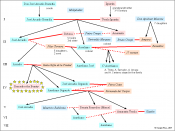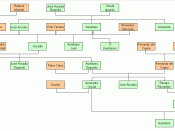Isolation does not necessarily result in being a detriment to humans; it can actually prove to be beneficial to their progress. In One Hundred Years of Solitude by Gabriel Garcia Márquez, the author portrays the isolation of the characters by the surrounding bodies of water. The BuendÃÂa family spends generations trying to exceed in a society that is growing increasingly dependent on technology and power. The journey of the BuendÃÂa family and people of Macondo encounter trials and obstacles when they connect to other civilizations. The struggles of the characters suggest that the alienation is more beneficial to their survival and progress.
In MárquezÃÂs novel, the BuendÃÂa family is isolated geographically and physically from civilization. Márquez shows the isolation of the BuendÃÂa family through the illustration of a village that is completely disconnected from the outside world. Macondo is the village and home of the BuendÃÂa family and it is completely, ÃÂsurrounded by water on all sidesà(Márquez, 13).
The people of Macondo believe that the outside world does not exist. The people also believe that they have no connection to other civilizations and hence, continue to search for routes, in order to be associated in some belief with another community. Furthermore, the BuendÃÂa family is isolated by the, ÃÂswamps, covered with an eternal vegetable scum, and the whole vast universe of the great swamp, which, according to what the gypsies said, had no limitsà(Márquez, 11). The clear evidence of the alienated village of Macondo is further supported by the gypsies. Even though Macondo is so geographically isolated, Ursula, a member of the BuendÃÂa family, finds a pathway that connects them with civilization. Additionally, Macondo returns back to a state of solitude through the disastrous storm that takes place within the village. The rain that lasts for nearly three years wipes out and destroys nearly everything. The weather of Macondo changes in order to reflect the BuendÃÂaÃÂs family troubles, ÃÂthe sky crumbled into a set of destructive storms and out of the north came hurricanes that scattered roofs about and knocked down walls and uprooted every last plant on the banana grovesà(Márquez, 339). The rain and hurricanes significantly damage Macondo; this helps the village to return back to the way it existed before it was connected to any civilization. The banana groves are nonexistent anymore and this reflects how the storm helps to overcome the problems the banana plantation has created. In MárquezÃÂs novel, water helps keep Macondo isolated. Through the surrounding bodies of water and storms that occur, water is a sort of protection to Macondo from other civilizations. Water helps keep Macondo in its solitude state and also helps to return it back to its division when it is connected with civilization. The alienation that the village of Macondo experiences displays the independence and richness it prevails within itself without contact of the outside world.
In One Hundred Years of Solitude, once Macondo is connected to civilization, it encounters many obstacles and eventually becomes corrupt and approaches declination. Macondo becomes connected to civilization through the pathway that Ursula finds. Problems arise and the village begins to become corrupt through the disease known as the insomnia plague. The plague causes the people of Macondo to lose their memory. The community falls apart due to the insomnia plague and it, ÃÂrealized that the day might come when things would be recognized by their inscriptions but that no-one would remember their useà(Márquez, 52). The sign of civilians losing their memory is a clear downfall for the people of Macondo. However, Macondo is able to overcome from the insomnia plague. As the village finally begins to move on from the recovery of the plague, the banana plantation invades Macondo and leads to its greater downfall. The workers of the banana plantation are treated poorly and this eventually causes the workers to go on strike. As the civilians try to break free from the plantation and become independent, ÃÂthey burned plantations and commissaries, tore up tracks to impede the passage of the trains that began to open their path with machine-gun fireà(Márquez, 326). The reactions of the workers show that they are thriving to return back to isolation by breaking the bond with the outside world. However, the people of Macondo are overcome by government power and face consequences for the damages they have done. The result of the rebellious workers is death as they are killed by machine guns. In summation of Macondo history, ÃÂthe strike was over, that three thousand dead people had been thrown into the sea, that the banana company had left, and that Macondo finally had peace after many yearsà(Márquez, 413). Numerous people have died in the community because of the banana plantation and the diseases in Macondo. From the situations, the village is only beneficial through natural disasters. When it comes to encountering civilizations face-to-face, the result can be consequential as they are not strong enough to stand alone with another civilization.
The BuendÃÂa family is better off isolated than being connected to civilization; they are more prosperous and joyful when in solitude. Macondo is a place found by the BuendÃÂa family. This village, known as Macondo, ÃÂwas a truly happy village where no one was over thirty years of age and where no one had diedà(Márquez, 10). The quote shows the purity and innocence of the village and their people. The isolated community is far from corrupt and consists of richness and prosperity within themselves. The young village satisfies the living conditions of their own people and keeps them happy and safe while alienated from other societies. When Macondo becomes part of another civilization, the people, ÃÂlost their sense of reality, the notion of time, the rhythm of daily habitsà(Márquez, 435). This state of mind means that the people are growing old. The people are unable to process the daily routines, keep track of time, and understand of what is going on around them. This also shows the lives of the people are brutal while connected to civilization. The concept of time in Macondo changes when they become connected to civilization and, ÃÂthe years nowadays donÃÂt pass the way the old ones used toà(Márquez, 263). It becomes clear that the days are not the same as before because of the trials that Macondo goes through. The people in Macondo face death, governmental problems, and poor working conditions in which none of the civilians of Macondo have come across when isolated. These situations result to have a disastrous living when associated with the outside world. However, the result of Macondo being back to isolation portrays peace and prosperity of Macondo and their villagers. The purity of Macondo results through the solitude of the village from civilization. Therefore, Macondo results into true happiness when there is no connection to the outside world as it lives upon their own power and living conditions.
The importance of this novel displays that isolation is better than being connected to the outside world. The isolation through water helps them obtain their privacy and lets them remain happy in their very own little world. Isolation better serves the charactersÃÂ development and survival than their trials with other civilizations. The novel is a reflection of humans in the modern world. Through the advent of technology and the struggle for power, human values and progress may actually be declining.
BibliographyGarcÃÂa Márquez, Gabriel. One Hundred Years of Solitude. Trans. Gregory Rabassa.
New York: Harper & Row, Publishers, 1970.





